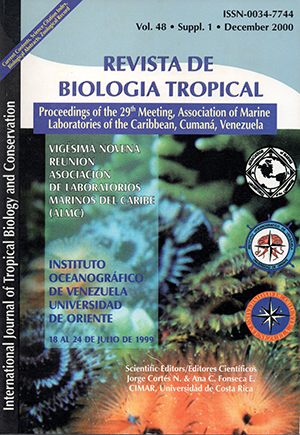Abstract
Benthic test species used in toxicity assays are the best indicators of sediment toxicity because they live in direct contact with sediments and the water column. Mercury chloride is one the most toxic metallfe salts. Its strong affinity for particles explains the high Hg content found in benthic populations. The genus Emerila is abundantly found in Venezuelan coasts and is a good bioaccumulator of pollutants, but the toxicological assays performend on this,genus ¡u-e scarce. The present experimental test reports on the distribution of mercury in the water column and sediment, using static bioassay in short term (24hr) and the ability of Emerita portoricensis lo bioconcentrate mercury under experimental conditions. Our resists suggest that the Hg transference from water to sediment is enhanced in the presence of Emerita. The kinetic uptake of Hg in Emerita portoncensisis shows a mechanism of rapid absorption reaching high metal concentrations in short exposure times.##plugins.facebook.comentarios##

This work is licensed under a Creative Commons Attribution 4.0 International License.
Copyright (c) 2000 Revista de Biología Tropical
Downloads
Download data is not yet available.


